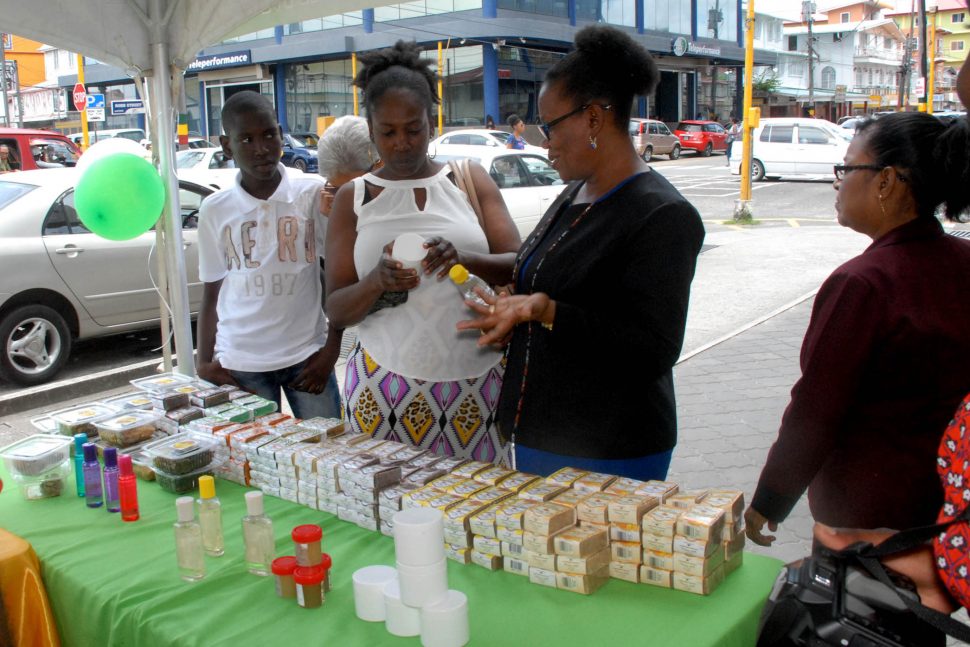With both the public and private sectors now seemingly focused on stepping up the pace of efforts to expand both the domestic and external markets for agro-processed products, local agro processors have been granted yet another of a number of modest openings to go beyond the established outlets in their quest to take their products to a limited local market.
Beginning last week, the Guyana Marketing Corporation (GMC) began offering limited space on the grass verge outside the Camp and Robb streets premises of the Republic Bank to market what they produce.
The display and sale opportunity is being offered to two agro processors, simultaneously, every Wednesday and Friday.to display their offerings to the hundreds of people who pass that way daily; and if the experience is not likely to be a life-changing one in business terms for the beneficiaries, it provides, at least, a likely one-day windfall, just the sort of experience that might send spirits soaring and serve as a long sought after take-off point for the small businesses involved.
The initiative falls within the sphere of the kinds of efforts which the GMC has been making through its Guyana Shop to open up opportunities to go with what has been a greater willingness by local supermarkets in recent times to display and sell locally produced jams, jellies, seasonings and condiments.
A release issued by the GMC last week announced that, in the first instance, ten named agro-processors will be afforded the opportunity to mount modest displays of their products outside Republic Bank on Robb Street, close to the busy Robb and Camp streets junction. More are to follow in the period beyond. The release lists honey, cassava bread and seasonings as being among the products that will be available for sale during the displays.
Through its Robb and Alexander streets Guyana Shop, the GMC already provides both display space and a marketing outlet for locally produced agro processed goods including a wide range of fruit-based condiments and a spokesperson for the Corporation told Stabroek Business in a telephone interview last week that the taking of the products to the streets was an initiative designed to further raise awareness of the locally produced products and to encourage patronage.
The GMC’s initiative to further promote local agro produce ‘on the streets’ comes on the heels of the staging late last year and early this year of two separate agro processing displays, titled UNCAPPED at the Sophia Exhibition Centre and the Providence Stadium, respectively. The events provided product exposure as well as one-off markets for scores of vendors offering a range of jams, jellies, wines, food seasonings and condiments. Critically, the UNCAPPED events allowed for the testing of local labeling and packaging standards against manufactured goods imported from the Caribbean and North America.
Product promotion apart, UNCAPPED also facilitated the coming together between vendors as support institutions including commercial banks and small business lending agencies.
Last Friday’s display space outside Republic Bank was occupied by local condiment manufacturer UMAMI and the beverage company INAVA whilst the remaining companies scheduled to display their products during the current month are Natural Rainforest Honey, Kingdom Apiary, Mel’s Products (Condiments) WAD Network (jams, jellies, peanuts, cassava products and sauces), Indigenous Coconut Oils and Sun Crest Farms.
Much of the discourse on the promotion of local agro produce has centred around what is widely felt to be the disproportionate marketing of local and foreign products with local manufacturers expressing concern over what they say are challenges associated with having their products enjoy an adequate level of display prominence in local supermarkets and other outlets. Whilst local outlets including the country’s major supermarkets have not been unresponsive to concerns raised by local manufacturers they make the point that consumer demands for high standards of product presentation give rise to the need to be selective in the acceptance of locally manufactured food and other products. Whilst it is generally acknowledged that local standards in the areas of packaging and labeling have improved in recent years, consumers as well as business support organizations acknowledge that, on the whole, local standards still lag behind the expectations of both the regional and international markets.





